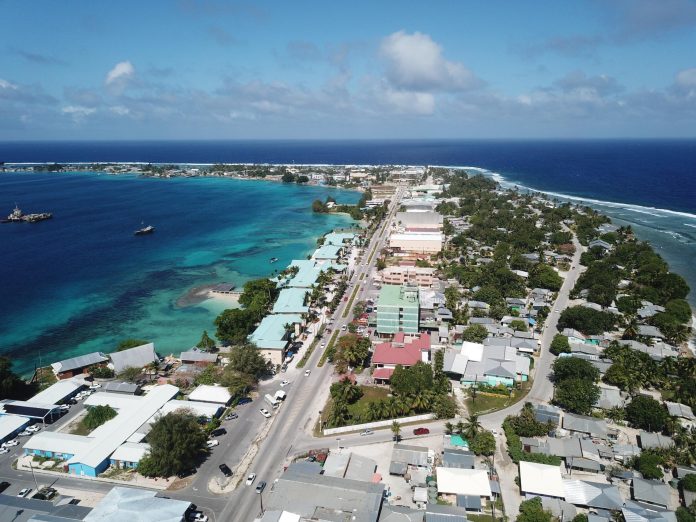By Omar Siddique, Economic Affairs Officer, Henry Cocker, Engagement Advisor, Sustainable Development, Pacific Islands Forum Secretariat, Portia Dugu, Pacific Regionalism Adviser, Pacific Islands Forum Secretariat
The Pacific Islands region is renowned for its pristine beaches, vibrant marine life, and unique cultural heritage. However, as the world progresses towards 2050, our Pacific paradise is encountering significant development and environmental challenges that are intensifying and accelerating because we as a global collective are still unable to limit global warming to 1.5 degrees Celsius.
In response to this challenge, Pacific leaders have put in place the 2050 Strategy for the Blue Pacific Continent, to give direction to our collective approaches to engage with, shape and secure our long-term wellbeing and prosperity in the face of climate change and other key challenges.
As part of this strategic direction, planned relocation and integrated urbaniaation will likely feature as key locally led actions to support sustainable development, within the framework of overall regional cooperation. This blog delves into the potential of urbanisation in the Pacific Islands context and explores the pivotal role of regional cooperation in shaping sustainable urban development.
According to the United Nations (ESCAP, 2019), the Pacific Islands region experienced an urban population growth rate of approximately 2.3 percent per year between 2000 and 2020 – one of the highest globally. By 2050, it is estimated that nearly 60 percent of the Pacific Islands population will reside in urban areas, significantly up from the current 45 per cent. This rapid urbanisation brings forth a multitude of challenges, including pressure on infrastructure and housing, informality, limited resources, increased waste generation, and potential damage to natural ecosystems. At the same time, urbanisation opens numerous economic opportunities to the Pacific Islands. By concentrating populations in urban areas, economies of scale can be achieved, attracting investments, promoting entrepreneurship, and creating livelihood opportunities.
The 2050 Strategy for the Blue Continent envisions the Pacific Islands region as a sustainable, resilient and integrated “Blue Continent.” To achieve this strategy sustainably, governments need to balance the demands of urbanisation and economic development with the need for environmental conservation and resilience in Pacific cities and towns. On this note, countries must leverage initiatives such as: developing eco-cities and eco-towns that prioritise renewable energy, green infrastructure and digitalisation; encouraging sustainable tourism practices that preserve natural resources and cultural heritage, and promoting circular economy models to reduce waste and enhance resource efficiency.
Considering the wealth of traditional knowledge across Pacific islands, locally-led initiatives can tap into this wisdom—be it in sustainable fishing practices, resilient agricultural methods, or community-based resource management—to contribute to our shared 2050 vision. Similarly, grassroots initiatives can support urban sustainability, from community gardens and local recycling programs to social enterprises that promote green jobs.
Sustainable urban development plays a crucial role in enhancing climate change resilience and adaptation. Integrated coastal management, introducing nature-based solutions into urban planning and design, and sustainable building practices can help mitigate the risks associated with climate change while ensuring the safety and well-being of all urban communities. Pacific Islands cities and towns need comprehensive urban plans that prioritise long-term sustainability, considering environmental impacts, social equity and cultural preservation. Integrated urban planning ensures the harmonious integration of infrastructure, transport, housing and public spaces, allowing cities to evolve holistically.
Voluntary Local Reviews (VLRs) which support localisation of the Sustainable Development Goals (SDGs) are powerful tools to advance integrated urban planning and actions for sustainability. Suva City Council is the first municipality from a Pacific Small Island Developing State to conduct a VLR. In 2023, with support from ESCAP and the Pacific Urban Partnership, the VLR serves as a foundation for the cities’ 10-year long term development plan putting SDGs at the centre. Suva’s 2023 VLR is also being conducted in complementarity with Fiji’s 2023 VNR report. The VNR highlights the importance of local action under its ‘means of implementation’ section whose key message is ‘Local SDG action begins with Voluntary Local Reviews’. This in turn provides greater national government support for the design and implementation of Suva’s new 10-year development plan.
Regional cooperation is vital for addressing cross-cutting challenges, sharing best practices, and harmonising policies. Pacific Islands countries can collaborate on urban planning, resource management and capacity-building initiatives to enhance sustainable urban development. Platforms such as the Pacific Urban Forum and Asia-Pacific Urban Forum facilitate policy dialogue and coordination. By pooling resources, expertise and knowledge, Pacific Islands nations can overcome resource limitations and accelerate sustainable urban development. Regional organizations, academic institutions, and international partners can facilitate knowledge exchange, technical assistance, and funding mechanisms.
As the Pacific Islands continue to experience rapid urbanization, integrated urban development planning and actions will gain greater importance. By leveraging economic opportunities, promoting sustainable infrastructure and resource management, enhancing climate change resilience, and fostering regional cooperation, the Pacific Island nations can build a sustainable future for their citizens. With a careful balance between development and environmental conservation, the Pacific Islands can transform urbanisation into a catalyst for prosperity, social well-being and environmental resilience in the years leading up to 2050.
SOURCE: UNESCAP/PACNEWS















